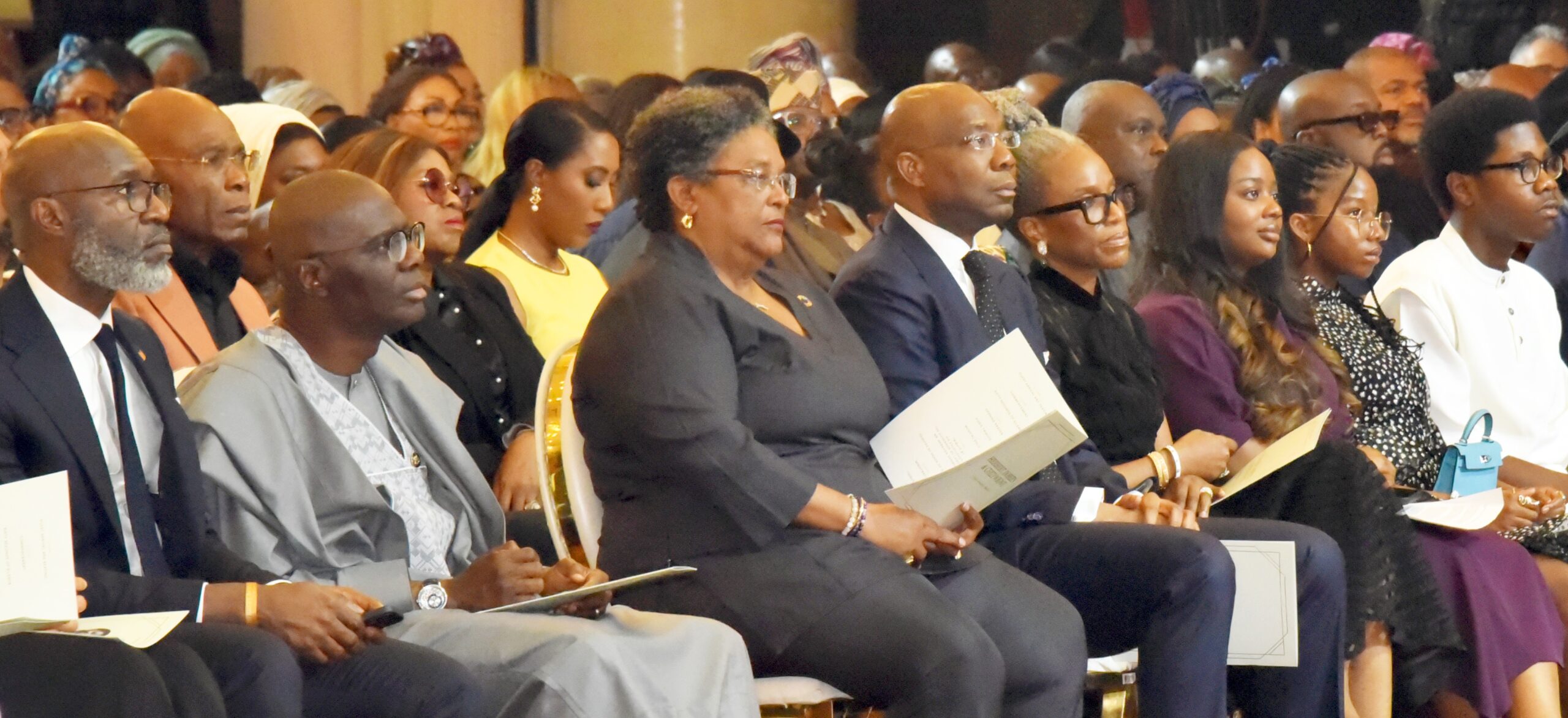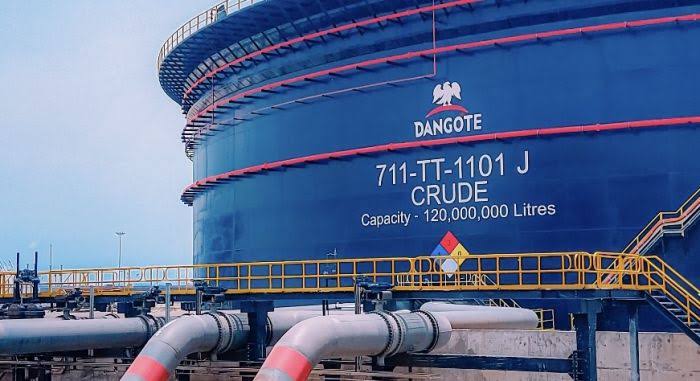News
Access Holdings Launches AccessGive to Advance Herbert Wigwe’s Legacy

By Gloria Ikibah
Access Holdings PLC has introduced AccessGive, a new platform designed to continue the impactful work of the late Herbert Wigwe.
The launch took place at the Herbert Wigwe One Year Memorial on Sunday, February 9, 2025, in Lagos, serving as a commitment to sustaining his legacy of education, empowerment, and community development.
Herbert Wigwe was not just a leader but a visionary who believed in creating opportunities and driving long-term change. His work went beyond banking, focusing on youth empowerment, education, and healthcare through The HOW Foundation. He also founded Wigwe University, an institution built to nurture Africa’s next generation of innovators and change-makers.
Understanding that a true legacy is carried forward through action, AccessGive was created as a platform for meaningful contributions. It connects individuals and organizations with high-impact social initiatives in education, healthcare, environmental sustainability, and community development. With a focus on transparency and collaboration, the platform ensures that every donation directly contributes to measurable progress.
AccessGive features a user-friendly interface that allows supporters to explore and fund projects that align with Herbert Wigwe’s vision. The platform offers real-time updates, transparent donation tracking, and social sharing tools, ensuring that every contribution makes a tangible difference. By supporting projects under The HOW Foundation and Wigwe University, donors are investing in the future Herbert Wigwe envisioned—one where young Africans receive world-class education, mentorship, and opportunities to shape the continent’s future.
News
Senate committee proposes N10b budgetary vote for capital market

The Senate has recommended that the Federal Government approve an allocation of N10 billion in the current year’s budget to facilitate literacy development within the capital market.
This recommendation was presented by Osita Izunaso, the Chairman on Capital Market, during the appearance of Dr. Wale Edun, the Minister of Finance and Coordinating Minister for the Economy, and Dr. Emomotimi Agama, the Director General of the Securities and Exchange Commission (SEC), before the panel in Abuja yesterday.
Izunaso noted that this request is aimed at enhancing the capital market’s operations, thereby contributing effectively to the overall economic development.
The committee chairman, who regretted that only 5,000 investors were in the capital market, said a special fund would boost the sector.
“We are asking for an intervention for capital allocation, a special funding to finance literacy development in the capital market because that is where the problem is.
“So, if you do that, we will be happy and the capital market will blossom. You will get our letter in that regard today after this meeting.
“That is the hallmark of what Senator Victor Umeh said, that most of them (investors) lost their money through this capital market system. People lost money; people have not regained confidence and we are pushing them,” Izunaso said.
Senator Victor Umeh (LP, Anambra Central) had described the capital market as an essential indicator of “the health of any economy” and how the capital market operates across the world.
He said: “From the past experience from the capital market, a lot is expected to be done to restore public confidence in the Nigerian Stock Exchange (NSE).
“Being able to restore public confidence is key to the operations in that sector. Why we said this is because what we saw was a shock and traumatic experience where investors in the market lost all their funds.”
The Chairman of the Senate Committee on Finance, Sani Musa, explained that the request for N10 billion for literacy and enlightenment was necessary in the light of the current realities.
“We need to see how we can take money out from the budget for the campaign,” he said.
Edun announced that President Bola Ahmed Tinubu had set up a target of $1 trillion economy, adding: “What matters is the vibrancy of the economy.
“This is in terms of having economic stability at the macro level, in terms of the revenues, budget deficits, and inflation rates such that the coming together of these major variables can create a stable environment which will improve investment, including investment in the capital market through the stock exchange.
“All these are under the purview of the SEC.
We now have a much more stable macro economy for investments as a result of the President’s decisive, timely intervention.”
Also, Senate President Godswill Akpabio yesterday promised that the Red Chamber will pass this year’s N54.2 trillion Appropriations Bill latest by tomorrow.
Akpabio made the promise during plenary, urging relevant committees to take swift actions to make the passage possible.
He said: “We need to finish quickly to brush up the budget for possible presentation tomorrow (Wednesday) or next (Thursday).”
President Bola Ahmed Tinubu had initially presented a ₦49.7 trillion budget to the National Assembly on December 18, last year.
But on February 5, he revised the budget upwards to ₦54.2 trillion, citing additional revenue to be generated by key government agencies.
The President said the increase was backed by ₦1.4 trillion in additional revenue from the Federal Inland Revenue Service (FIRS), ₦1.2 trillion from the Nigeria Customs Service (NCS), and ₦1.8 trillion from other government agencies.
News
Dangote Refinery crashes diesel price from N1,075 to N1,020 per litre

Dangote Petroleum Refinery & Petrochemicals has reduced the cost of its diesel product from N1,075 to N1,020 per litre at the gantry price in an effort to better serve its customers and Nigerians in general.
Since it began diesel production in January 2024, Dangote Refinery has reduced the price of diesel more than three times, from an initial N1,700 per litre to the current rate, thus providing much-needed relief to manufacturers and consumers alike.
The latest reduction of N55 per litre for diesel follows the revelation by Development Economist and Public Policy Analyst, Prof. Ken Ife, that the Dangote Petroleum Refinery sacrificed over N10 billion to ensure the availability of petrol at a uniform price nationwide during the Yuletide period.
He also praised the refinery for setting a new benchmark in Nigeria’s energy sector by unlocking vast opportunities for export revenue.
Speaking on the transformative impact of the refinery on Arise TV, Prof. Ife explained that for years, the equalisation fund had been responsible for managing the price differentials and transportation costs involved in distributing petroleum across the country.
But it has been reported that the fund owes marketers over N80 billion, according to the development analyst.
“What has actually happened is that the president has shifted the subsidy burden away from the public purse and onto the private sector.
The equalisation fund, which was meant to cover the price differential and transportation costs, plays a crucial role. If petroleum is to be sold across the country at a set price, then transportation costs must be accounted for to ensure this is possible. That’s the purpose of equalisation.
However, the equalisation fund is reported to owe around N80 billion to the marketers, and this issue is still under discussion.
“During the Christmas season, which is traditionally the most challenging period, we often face shortages of petroleum, petrol hoarding, and arbitrary price hikes, all of which impact the cost of food.
In response, during this last yuletide, the Dangote Group made the decision to absorb the costs. They equalised the price themselves, at a cost of over N10 billion. In doing so, they effectively absorbed the subsidy,” he said.
Prof Ife also said the facility is steering Nigeria away from its traditional focus on Premium Motor Spirit (PMS) towards a diversified range of petroleum-based exports.
He added that with major international players such as BP and Saudi Aramco purchasing refined products from Nigeria, the country is swiftly becoming a key player in the global petroleum market.
The analyst expressed confidence that Nigeria is on the path to self-sufficiency in petroleum products, while simultaneously positioning itself as an energy export powerhouse.
News
Customs bows to pressure, suspends 4% FOB charge

The Nigeria Customs Service (NCS) has announced the suspension of 4 percent Free-on-Board charge on value of imports.
The suspension was the outcome of the ongoing consultations with the Minister of Finance and Coordinating Minister of the Economy, Olawale Edun and other stakeholders.
The NCS National Public Relations Officer, Assistant Comptroller of Customs, Abdullahi Maiwada disclosed the development in a statement made available on Tuesday.
He said: “The Nigeria Customs Service (NCS) hereby announces the suspension of the implementation of 4% Free-on-Board (FOB) value on imports as provided in Section 18(1)(a) of the Nigeria Customs Service (NCSA) 2023.
This is sequel to ongoing consultations with the Minister of Finance and Coordinating Minister of the Economy, Olawale Edun and other Stakeholders.”
According to the statement, the suspension will enable comprehensive stakeholder engagement and consultations regarding the Act’s implementation framework.
NCS said the timing of the suspension aligns with the exit of the contract agreement with the Service providers, including Webb Fontaine, which were previously funded through the 1% Comprehensive Import Supervision Scheme (CISS).
It added that the development presents an opportunity to review its revenue framework holistically.
The statement said under the previous funding arrangement repealed by the NCSA 2023, separating the 1% CISS and 7% cost of collection created operational inefficiencies and funding gaps in customs modernisation efforts.
The new Act, according to the statement, addresses these challenges by consolidating “not less than 4% of the Free-on-Board value of imports,” designed to ensure sustainable funding for critical customs operations and modernisation initiatives.
The statement reads in part: “This transition period will allow the Service to optimise the management of these frameworks to serve our stakeholders and the nation’s interests better.
“The Act further empowers the Service to modernise its operations through various technological innovations. Specifically, Section 28 of the NCSA 2023 authorises developing and maintaining electronic systems for information exchange between the Service, Other Government Agencies, and traders.
“The Service is already implementing several digital solutions, including the recently deployed B’Odogwu clearance system, which stakeholders are benefiting from through faster clearance times and improved transparency.
“Other innovative solutions authorised by the Act include; Single Window implementation (Section 33), Risk management systems (Section 32), Non-intrusive inspection equipment (Section 59) and Electronic data exchange facilities (Section 33(3).
“The suspension period will allow the Service to further engage with stakeholders while ensuring proper alignment with the Act’s provisions for sustainable funding of these modernisation initiatives.
“The NCS remains committed to implementing the provisions of the Act in a manner that best serves our stakeholders while fulfilling our revenue generation and trade facilitation mandate.
“We will communicate the revised implementation timeline following the conclusion of stakeholder consultations.”
-

 News17 hours ago
News17 hours agoTension as MTN Increases 15GB Data Price from N2,000 to N6,000
-

 News17 hours ago
News17 hours agoNUC increases varsities application fee to 400%
-

 News17 hours ago
News17 hours agoJUST IN: JAMB Declares 320 UTME cutoff for candidates Under 16
-

 News17 hours ago
News17 hours agoGaza peace accord under threat after Trump’s warning
-

 News17 hours ago
News17 hours agoFresh Lagos assembly speaker makes new appointments
-

 News23 hours ago
News23 hours agoNDLEA declares 4 members of drug cartel wanted(Photos) …Over cocaine shipments to Saudi Arabia, Qatar, others
-

 News8 hours ago
News8 hours agoIGP Egbetokun tenders apology to Senate, promises to answer queries
-

 News15 hours ago
News15 hours agoMore headache for Nigerians as CBN imposes N600 charge on every N20,000 withdrawn from another bank’s ATM

















